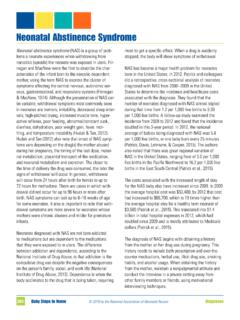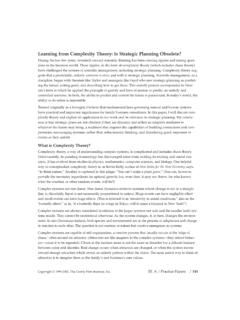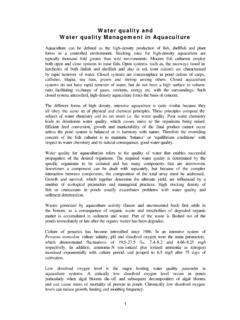Transcription of Developmental Care - Baby Steps to Home
1 Step 215 Baby Steps to Home 2018 by the National Association of Neonatal NursesDevelopmental CareWhat Is It and Why Is It Important?Preterm infants are hospitalized in a care environment that is very different from the maternal womb, where optimal growth and development of the fetus occurs. Therefore, the application of Developmental care prin-ciples in the neonatal intensive care unit (NICU) is criti-cal to improve neurodevelopmental outcomes of preterm infants. Developmental care is a strategy to help reduce the amount of environmental and sensory stress that a premature infant is exposed to after care practices can be predictive of long-term neurobehavioral outcomes in preterm infants. In one study (Montirosso et al., 2012), infants from NICUs with high scores in infant-centered care had higher attention and regulation, less excitability, less hypotonicity, and lower stress scores than infants discharged from lower scoring are many aspects of Developmental care .
2 These include family-centered care principles such as open visitation and kangaroo care (shown below) infant behavioral or cue monitoring positioning (providing boundaries and avoiding W or M placement of extremities) handling (avoiding the preemie flip, when infants are turned rapidly; telling infants when they will be touched) bathing (should be a family intervention) helping infants regulate , there is no time when Developmental care is not appropriate because routine care is never innocuous to care . Courtesy of Joan Smith, MSN NNP-BC, and Mary Raney, MSN NNP-BC, St. Louis Children s positioning without confinement. Courtesy of Joan Smith, MSN RN NNP-BC, and Mary Raney, MSN RN NNP-BC, St. Louis Children s Hospital with pacifier. Courtesy of Joan Smith, MSN NNP-BC, and Mary Raney, MSN NNP-BC, St. Louis Children s 216 Baby Steps to Home 2018 by the National Association of Neonatal NursesReferencesMontirosso, R.
3 , Del Prete, A., Bell , R., Tronick, E., Borgatti, R., & the Neonatal Adequate care for Quality of Life (NEO-ACQUA) Study Group. (2012). Level of NICU quality of Developmental care and neu-robehavioral performance in very preterm infants. Pediatrics, 129(5), e1129 e1137. Drake, E. (2016). Positioning of the neonate for best outcomes. Retrieved from , C., & McGrath, J. M. (2010). Developmental care of newborns and infants. Glenview, IL: National Association of Neonatal Nurses. Symington, A., & Pinelli, J. (2004). Developmental care for promoting development and preventing morbidity in preterm infants. Cochrane Database of Systematic Reviews, 4, Baby Steps to Home 2018 by the National Association of Neonatal NursesStep 2 Developmental care : Information for ParentsAs a preemie, your baby needs special care and attention. While your baby is in the neonatal intensive care unit (NICU), the staff will try to create an environment that is safe, quiet, and more like being in the womb than being in a noisy, busy hospital.
4 They will do this by keeping the lights low, using soft voices, and positioning your baby s body so that it is cradled in the isolette. Bright lights and loud noises may bother your baby, especially if he or she is very premature or very staff will be very gentle with your baby. This is because a premature baby s skin can be very fragile and sensitive to touch. You also may find that your baby needs to be held or positioned in certain ways to be calm and comfortable. Learning the best way to care for your baby now can help him or her grow and develop down the of the time, preemies and sick babies are asleep. It is best to avoid waking them because they need sleep to grow and get well. As babies get closer to full term and get stronger, they will be able to stay awake for longer periods of time. Preemies and sick babies are very sensi-tive to overstimulation.
5 Try to focus on one of your baby s senses at a time. For example, touch your baby and then talk to him or her not both at the same develop the sense of touch early, so they can be very sensitive. Ask your baby s nurse to help you use touch in a positive way. This might include using a constant, firm but gentle touch; a back-and-forth touch like stroking or massaging can be too much for a premature baby gently cupping one hand under the head and another hand on the bottoms of the feet to support a fetal position using skin-to-skin contact (also called kangaroo care ) as soon as your baby is ready, putting your finger in your baby s hand so he or she can hold use taste and smell to know who their parents are while they are in the womb. They continue to use these senses to get to know you during their NICU stay as well. Be sure to not wear perfumes or scented lotions.
6 Some mothers can place a cloth that smells like their breast milk in their baby s isolette. This smell is unique to you and can help your baby connect and bond with time you also will learn to read your baby s cues. Cues are things your baby does that show what he or she is feeling. Ask your NICU nurses to teach you what your baby is saying by the way he or she is acting. Learn-ing to read your baby s cues will help you care for your baby when you go home together. For example, you will learn the difference between an angry cry and hungry cry. Also, you ll know whether your baby, when given a paci-fier, either just doesn t like it or needs you to hold it in his or her mouth. Eventually, you will be the expert and will know what your baby needs to grow and and baby enjoy skin-to-skin time. University of Texas Southwestern Medical Center. Reprinted with permission.








